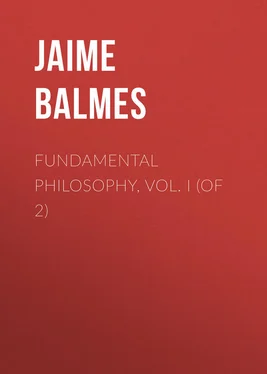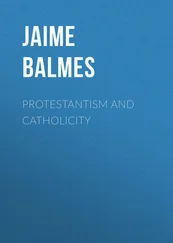Jaime Balmes - Fundamental Philosophy, Vol. I (of 2)
Здесь есть возможность читать онлайн «Jaime Balmes - Fundamental Philosophy, Vol. I (of 2)» — ознакомительный отрывок электронной книги совершенно бесплатно, а после прочтения отрывка купить полную версию. В некоторых случаях можно слушать аудио, скачать через торрент в формате fb2 и присутствует краткое содержание. Жанр: foreign_antique, foreign_prose, на английском языке. Описание произведения, (предисловие) а так же отзывы посетителей доступны на портале библиотеки ЛибКат.
- Название:Fundamental Philosophy, Vol. I (of 2)
- Автор:
- Жанр:
- Год:неизвестен
- ISBN:нет данных
- Рейтинг книги:3 / 5. Голосов: 1
-
Избранное:Добавить в избранное
- Отзывы:
-
Ваша оценка:
- 60
- 1
- 2
- 3
- 4
- 5
Fundamental Philosophy, Vol. I (of 2): краткое содержание, описание и аннотация
Предлагаем к чтению аннотацию, описание, краткое содержание или предисловие (зависит от того, что написал сам автор книги «Fundamental Philosophy, Vol. I (of 2)»). Если вы не нашли необходимую информацию о книге — напишите в комментариях, мы постараемся отыскать её.
Fundamental Philosophy, Vol. I (of 2) — читать онлайн ознакомительный отрывок
Ниже представлен текст книги, разбитый по страницам. Система сохранения места последней прочитанной страницы, позволяет с удобством читать онлайн бесплатно книгу «Fundamental Philosophy, Vol. I (of 2)», без необходимости каждый раз заново искать на чём Вы остановились. Поставьте закладку, и сможете в любой момент перейти на страницу, на которой закончили чтение.
Интервал:
Закладка:
168. Manifestly, then, Descartes' principle, taken as a true argument, cannot be defended; and it is so easy to see its defect, that it seems impossible for so clear and penetrating an intellect to have overlooked it. It is therefore probable that Descartes understood his principle in a very different sense; and we will now briefly show what meaning, in our judgment, the illustrious philosopher must have given to it.
Supposing himself for a moment in universal doubt, without accepting for certain anything that is known, he concentrated himself on himself, and in the depth of his soul sought a point whereon to base the edifice of human cognitions. Although we abstract all around us, we clearly cannot abstract ourselves, our mind, which is present to its own eyes, only the more lucidly, the greater the abstraction in which we place ourselves with respect to eternal objects. Now in this concentration, this collection of himself within himself, this withdrawal from every thing for fear of error, and asking himself if there be any thing certain, if there be any foundation and starting-point in the career of knowledge; first of all is presented to him the consciousness of thought, the very presence of the acts of his mind. If we mistake not, this was Descartes' thought: I wish to doubt of every thing; I refrain from affirming as from denying any thing; I isolate myself from whatever surrounds me, because I know not if it be any thing more than an illusion. But in this very isolation, I meet with the intimate sense of my internal acts, with the presence of my mind; I think, therefore I am; this I feel in a manner that leaves no room for doubt or uncertainty; therefore, I am; that is to say, this sense of my thought makes me know my existence.
169. This explains why Descartes did not present his principle as a mere enthymema, as an ordinary argument, but as determining a fact presented to him and first in the order of facts: even if he inferred existence from thought, it was not by deduction, properly so called, but as one fact contained in another, or rather identified with it.
We say identified , because it really is so in Descartes' opinion; and this confirms what we have already advanced, that this philosopher did not offer an argument, but laid down a fact. According to him, the essence of the soul consists in thought; and as other schools of philosophy distinguish between substance and its acts, considering the mind in the first class, and thought in the second, so Descartes held that there was no distinction between mind and thought, that they were the same thing, that thought constituted the essence of the soul. "Although one attribute," he says, "suffices to make us know the substance, there is, nevertheless, in every substance one attribute, which constitutes its nature and its essence, and on which all the others depend. Extension in length, breadth, and depth, constitutes the essence of corporeal substance; and thought constitutes the nature of the substance which thinks." 9 9 Descartes. Principes de la Philosophie , 1ière partie.
From this it follows that Descartes, in laying down the principle, I think, therefore I exist , only declared a fact attested by consciousness; and so simple did he consider it, and so unique, that in evolving his system, he identified thought with the soul, and its essence with its existence. He was conscious of thought, and said: "this thought is my soul; I am." It is not now our purpose to weigh the value of this doctrine, but only to explain in what it consists. (17) Конец ознакомительного фрагмента. Текст предоставлен ООО «ЛитРес». Прочитайте эту книгу целиком, купив полную легальную версию на ЛитРес. Безопасно оплатить книгу можно банковской картой Visa, MasterCard, Maestro, со счета мобильного телефона, с платежного терминала, в салоне МТС или Связной, через PayPal, WebMoney, Яндекс.Деньги, QIWI Кошелек, бонусными картами или другим удобным Вам способом.
CHAPTER XVIII.
THE PRINCIPLE OF DESCARTES, CONTINUED. – HIS METHOD
170. Descartes did not always express himself with, sufficient accuracy when announcing and explaining his principle; and hence his words have been misinterpreted. In the passage where he establishes consciousness of our own thought and existence as the foundation whereon all our cognitions must rest, he uses terms from which it can be inferred that he not only means to declare a fact, but that he also intends to afford a true argument. Nevertheless, if we read his words attentively, and compare them with one another, it will be evident that such was not his idea, although we should not sometimes be wrong in saying that he did not make sufficient account of the difference, which we have just pointed out, between an argument and the simple declaration of a fact; and that, when concentrating himself on himself, he did not have a sufficiently clear reflex knowledge of the manner in which he rested upon his fundamental principle. To convince ourselves of this, let us examine his own words: "While we thus reject every thing of which we can have the least doubt, and even feign that it is false, we easily suppose that there is no God, no heaven, no earth; that we have not a body: but we cannot in like manner suppose that we are not whilst we doubt the truth of all these things; for we experience so great repugnance to conceive that what thinks is not at the same time that it thinks, that notwithstanding all the most extravagant suppositions, we cannot help believing this conclusion, I think, therefore I am , to be true, and consequently the first and most certain to present itself to him who orders well his thoughts." 10 10 Descartes. Principes de la Philosophie , 1ière partie, N. 7.
In this passage we detect a true syllogism: whatever thinks, exists; but I think; therefore I exist. "We have," says Descartes, "so great repugnance to conceive that what thinks is not at the same time that it thinks;" which is the same as to say, whatever thinks, exists; and this, in scholastic terms, is to establish the major. He then says: "notwithstanding all the most extravagant suppositions, we cannot help believing this conclusion, I think, therefore I am , to be true;" which is equivalent to proving the minor, and the conclusion of the syllogism. We know that Descartes was somewhat taken up with the idea of proving at the same time that he was engaged in declaring. This was the general tendency of his age, and even the most ardent reformers with difficulty preserved themselves from the surrounding atmosphere. We encounter this same spirit throughout his meditations, admirably joined, however, with the spirit of observation.
But through these obscure or ambiguous explanations, what thought do we discover at the bottom of Descartes' system when we abstract his having, or not having, rendered himself an exact account of what he experienced? This thought: "By an effort of my mind I can doubt the truth of everything; but this effort has a limit in myself. When I turn my attention upon myself, upon the consciousness of my internal acts, upon my existence, doubt is at an end; it cannot extend so far: I find so great repugnance that the most extravagant suppositions cannot overcome it." This his very words show: besides declaring this fact, he rises to a general and undoubtedly true proposition; he draws a conclusion also very legitimate; but neither of these was at all necessary to the present case; neither seemed to explain well his opinion, but either served to confuse it.
Читать дальшеИнтервал:
Закладка:
Похожие книги на «Fundamental Philosophy, Vol. I (of 2)»
Представляем Вашему вниманию похожие книги на «Fundamental Philosophy, Vol. I (of 2)» списком для выбора. Мы отобрали схожую по названию и смыслу литературу в надежде предоставить читателям больше вариантов отыскать новые, интересные, ещё непрочитанные произведения.
Обсуждение, отзывы о книге «Fundamental Philosophy, Vol. I (of 2)» и просто собственные мнения читателей. Оставьте ваши комментарии, напишите, что Вы думаете о произведении, его смысле или главных героях. Укажите что конкретно понравилось, а что нет, и почему Вы так считаете.












